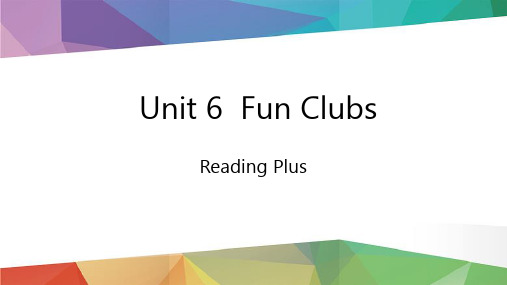人教版七年级上册unit5讲义
人教版七年级英语上册课件:unit5(共31张PPT)

Yes, I do.
Do you have a ping-pong ball? No, I don’t.
Do you have a …?
Yes, I do. / No, I don’t.
2a
Listen to the conversations and number the pictures [1-4].
Dale
Does … have a ______?
Yes, … No, …
Paul
Mike
2d Role-play the conversation.
Cindy: Hey, Helen, let’s go! We’re late. Helen: OK. Cindy: Do you have the baseball? Helen: Yes, I do. It’s in my bag. Cindy: And where’s our baseball bat? Helen: Bill has it. Cindy: Oh, yeah. And do you have your jacket? Helen: Oh, no, I don’t. It’s on the chair. Let me get it. Cindy: And your hat, too! Helen: OK, I have my jacket and hat. Let’s go.
Learning Aims:
1.能掌握下列词汇:do (does), have, tennis, ball, ping-pong, bat, soccer, soccer ball, basketball, let, us, let's go, we, late, has, get .
人教版(2024) 七年级 英语上册Unit 5 Fun Clubs 单词讲解(共32张PPT)

fall in love with
爱上
take photos/take a photo
拍照
collect
/kə'lekt/ v. 收集;采集
insect
/'ɪnsekt/ n. 昆虫
discover
/dɪ'skʌvə(r)/ v. 发现;发觉
wildlife
/'waɪldlaɪf/ n. 野生动物;野生生物
ability
/ə'bɪləti/ n. 能力;才能 have an ability in sth
在某事上有天赋
paint
/peɪnt/ v. 用颜料画;在……上刷油漆
n. 油漆;mountains 爬山
more
/mɔː(r)/ adj. & pron. 更多(的)
soon
/suːn/adv. 不久;很快
than
/ðæn; ðən/prep. & conj.(用以引出 比较的第二部分)比 more than 多于
mind
/maɪnd/ n. 头脑;心思 keep sth. in mind 记住某事
fall
/fɔːl/ v. & n. 进入;掉落;跌倒
n.(美式)秋天
act
/æ kt/ v. 扮演;行动 n.(戏剧等)一幕;行动
act out 表演
at home
在家里
interested
/'ɪntrəstɪd/ adj. 感兴趣的 be interested in 对……感兴趣
nature
/'neɪtʃə(r)/n. 自然界;大自然
beef
/biːf/n. 牛肉 不可数名词
Unit5讲义人教版英语七年级上册

U5 Do you have a soccer ball必会内容:1学会一些运动项目的名词:soccer ball, tennis, pingpong ball, volleyball等2.掌握句型:“Do you have …? Does he/she have…?3.学会用have对物品的所属进行提问与问答。
4.学会使用描述形容词对事物做出。
5.学会句型“let’s“提建议并在情景中运用。
一.单项选择。
一、单项选择。
( ) 1. The English song ______very nice. Can you guess who is singing?A. smellsB. tastesC. soundsD. feels( ) 2. Let’s ______this song together.A. singsB. singC. singingD. to sing( ) 3. ______ you have a new basketball?A. IsB. AreC. DoD. Does( ) 4. –Let’s play pingpong!–Good idea, ______ I don’t have a bat.A. soB. orC. andD. but( ) 5. Let______ have a look at your sweater.A. myB. meC. ID. mine( ) 6. I only ______that famous star ______TV.A. watch, onB. watch, inC. see, atD. see, in( ) 7. –Do you know his name?–No, I ________.A. am notB. don’tC. can’tD. do ( ) 8. Zhang Wei ______an English dictionary.A. doesn’t hasB. haveC. doesn’t haveD. don’t have( ) 9. –Can you go to the movies ______ me?–Sure. Let’s go.A. withB. forC. toD. on( ) 10. –Do you have a puter game?–_____.A. Yes, it is.B. Yes, I have.C. No, I haven’tD. Yes, I do( ) 11. –Let’s _____pingpong ball. It’s time to have class.–All right.A. aren’t playB.doesn’t playC. don’t playD. not play( ) 12. –Does Anna have a pencil case?–______.A. No, she doesn’tB. Yes, she doC. No, she doD. Yes, she doesn’t( ) 13. –Let’s go to play football.–______.A. Not at allB. Thank youC. That sounds goodD. Good luck( ) 14. –Does your brother have a soccer?–Yes, but he doesn’t play sports. He only______ them on TV.A. watchB. watchesC. look atD. looks( ) 15. –Can Sally play_____ basketball?–No, she can’t.A. theB. aC. anD. /二、用方框中所给词的适当形式填空。
初中英语新人教版七年级上册Unit (第5课时) 教学课件(2024秋)

My father/mother is on the left/right. He/She is… My father/mother likes/loves/enjoys... The boy/girl next to me is... I am in the middle of the photo. He/She can play...well. I am good at/am interested in…
Introduce your family photo.
Homework
假如你叫李华,Helen是你的英国朋友,她想了解你的 家庭情况。请根据下面的全家福,给Helen发一封电子 邮件,介绍一下你的家庭。
前排左起 1. 李华 2. 爷爷 3. 奶奶 4. 堂妹 后排左起 1. 爸爸 2. 妈妈 3. 叔叔 4. 婶婶 要求:1. 照片中的每个人都要介绍,可适
结尾总结全文,表达爱意
Post-writing
Bring a family photo to class and write about it. Then tell your classmates about your family.
Hi. I am...Here is a photo of my family. These are... I really love my family...
This is my little brother, Hu Rui. He has big eyes.He’s very
clever and he likes _r_e_a_d_in_g__ a lot. We love and help each
other.
七年级英语上册(人教版)Unit5单元整体说课稿

一、教材分析
(一)内容概述
人教版七年级英语上册Unit 5主要围绕“My family and friends”展开,通过介绍家庭成员和朋友,让学生学习并掌握与家庭成员和朋友相关的词汇和表达方式,同时学习一般现在时态。此单元在整个课程体系中处于第二单元,紧接第一单元的“Hello, my name is...”,进一步加深学生对英语日常交流的理解和运用。主要知识点包括家庭成员和朋友的相关词汇,如mother, father, sister, brother, friend等;一般现在时态的构成和用法,如I like watching movies, She is a teacher等。
3.情感态度与价值观:培养学生对家庭成员和朋友的关爱和尊重,增强学生的人际交往能力,提高学生对英语学习的兴趣和积极性。
(三)教学重难点
1.教学重点:本节课的教学重点是一般现在时态的构成和用法,以及家庭成员和朋友的相关词汇。学生需要掌握一般现在时态的肯定句、否定句和疑问句的构成,并能运用所学词汇和句型进行实际交流。
(三)巩固练习
为了帮助学生巩固所学知识并提升应用能力,我计划设计以下巩固练习和实践活动:
1.小组讨论:学生分组讨论自己的家庭成员和朋友,用英语进行介绍和描述,并练习运用一般现在时态。
2.角色扮演:学生分组进行角色扮演,模拟真实场景,用英语介绍家庭成员和朋友,并尝试运用一般现在时态。
3.练习题:设计一些练习题,让学生在纸上完成,检测他们对家庭成员和朋友词汇和一般现在时态的掌握情况。
为了激发学生的学习兴趣和动机,我将采取以下策略或活动:
1.通过图片、视频等直观教具展示家庭成员和朋友的情景,引发学生的好奇心和兴趣。
Unit5 第1课时(Section A 1a-2d)课件 人教版英语七年级上册

A: _D__o_e_s_ Mike have a basketball? B: Yes, _h_e__d_o_e_s_____.
Exercises
I.单项选择。
1 —Does Jane have a ball?
—Yes, _______D_____
A .I am
B. it is
C. you do
1a
Match the words with the things in the picture.
1.tennis ball __a___
2.ping-pong bat __f__
3.soccer ball __c__ 4.volleyball ___e__
5.basketball __d___
6.baseball bat __b__
Does
2. Do you have a baseball racket?
bat
3. He have a bookcase.
has
4. Do you have a basketball? Yes, you have.
I
Summary
1. —Do you have a ...? —Yes, I do. I have.../ No, I don’t. I don’t have a...
A. Yes, he does.
B. No, he doesn’t.
C. No, I don’t.
Listen again and fill in the blanks.
Conversation 1: Bob: Do you have a soccer ball, Paul? Paul: _N__o_, _I_d_o_n_’_t__. Bob: Does your brother Alan _h_a_v_e_ one? Paul: Yes, he _d_o_e_s__.
人教版(2024)七年级英语上册 Unit 5 Fun Clubs 课件 (共15张PPT含内嵌音频

6. Read the conversation and complete the table.
Teng Fei: Hi there! What club do you want to join? Peter: ___I_h_a_v_e_n_o__id_e_a____. Teng Fei: Here’s some good news! Our school wants to start a music club. Do you want to join? Peter: Sure. I can play the guitar. _W__h_a_t_a_b_o_u_t_y_o_u____, Emma? Emma: _____I’_d_lo__ve__t_o_____, but I can’t play any musical instruments. Peter: Oh, but you can sing well. Teng Fei: Exactly! How about Ella? She can play the violin, right? Emma: Yes, she can. Peter: What instruments can you play, Teng Fei? Teng Fei: I can play the drums. Peter: ____T_h_a_t’_s_g_r_e_a_t ____! Let’s go to the music room after school!
Name Peter Emma Ella Teng Fei
can
Ability play the guitar
sing well play the violin play the drums
7. Talk about their abilities and make conversations.
2024-2025学年人教版七年级英语上册 Unit 5+Lesson 6 课件

Reading Plus
Learning Objectives
In this lesson you will: 1. find out how Alice introduce her drama club through a vlog; 2. understand detailed information about Alice’s drama club; 3. talk about the vlog you want to make about the things you
Very well OK Needs work
1. I know how Alice introduced her
drama club through a vlog.
2. I can understand the detailed
information about Alice’s drama club.
Have you ever seen a vlog before? What did you see in it? (e.g. travel, cooking, school life, playing with pets)
Scan the passage. What’s the genre of it? A. A story. B. A vlog script. C. A diary.
clip在这句话中的意思是“(电影或电视节目的)剪辑, 片段”。
E.g. During class, we watched a funny clip from the movie and everyone laughed.
4. The drama club can be hard when I have to remember a lot of lines, but it helps me to understand a lot more about the plays.
- 1、下载文档前请自行甄别文档内容的完整性,平台不提供额外的编辑、内容补充、找答案等附加服务。
- 2、"仅部分预览"的文档,不可在线预览部分如存在完整性等问题,可反馈申请退款(可完整预览的文档不适用该条件!)。
- 3、如文档侵犯您的权益,请联系客服反馈,我们会尽快为您处理(人工客服工作时间:9:00-18:30)。
一、单词do [du:, du] aux v.v. 做;干have [h?v, h ?v] v. 有tennis ['tenis] n. 网球ball [b ?:l] n. 球ping-pong乒乓球bat [b?t] n. 球棒;球拍soccer ['s?k?] n. (英式)足球soccer ball(英式)足球volleyball ['v ?lib ?:l] n. 排球basketball ['b ɑ :skitb?:l] n.篮球hey [hei] interj. 嘿;喂let [let] v. 允许;让us [?s, ?s] pron. 我们let's [lets] 让我们(一起)go [g?u] v. 去;走we [wi:] pron. 我们late [leit] adj. 迟到has [h?z, h ?z] v.( have 的第三人称单数形式)有get [get] v. 去取(或带来);得到great [greit] adj. 美妙的;伟大的play [plei] v. 参加(比赛或运动);玩耍sound [saund] v.听起来好像interesting ['intristi?] adj.有趣的boring ['b ?:ri?] adj. 没趣的;令人厌倦的fun [f ?n] adj. 有趣的;使人快乐的n.乐趣;快乐difficult ['difik?lt] adj. 困难的relaxing adj.轻松的;令人放松的watch [w ?t?] v.注视;观看TV ['ti:'vi:] n.电视;电视机watch TV看电视same [seim] adj. 相同的love [l ?v] v.n. 爱;喜欢with [wie ] prep.和⋯在一起;带有;使用sport [sp?:t] n. 体育运动them [e em, e?m] pron.( 宾格 )他(她,它)们only [' ?unli] adv. 只;仅like [laik] v. 喜欢;喜爱easy ['i:zi] adj. 容易的;不费力的after [' ɑ :ft?] prep在. ⋯以后class [kl ɑ :s] n班.级;课classmate ['kl ɑ :smeit] n同.学Bill [bil]比尔(男名)重点单词1. do实义动词做,干do助动词用法如下【延伸】实义动词:表示动作或状态的词。
助动词:协助主要动词构成谓语的动词。
1)构成一般疑问句,例如:Do you have a soccer ball? 你有足球吗?2) do + not 构成否定句,例如:I don’ t have a soccer ball我没.有足球。
3)构成否定祈使句,例如:Don't go there. 别去那儿。
说明 :构成否定祈使句只用do,不用 did 和 does。
4)放在动词原形前,加强该动词的语气,例如:Do come to my birthday party. 你一定来参加我的生日宴会。
5)用作代动词,例如:-- Do you like Beijing? --你喜欢北京吗?-- Yes,I do. --是的,喜欢。
(do 用作代动词,代替like Beijing.)2.have v.have 作动词,意为“有”,一般指某人拥有某物,侧重于所属关系。
其第三人称单数形式是has。
常用句式为:某人+ have/has + 某物,表示“某人有某物”。
在一般现在时态中,当主语为第三人称单数形式时,用has 的形式。
there be 也可以翻译成“有”的意思,但是它强调的是某个地方存在某种东西。
There is a tree on the hill.补充 :have 与其它的词组合成词组、短语,就不表示“有”了,其意思与后面的名词接近。
e.g. have classes 上课 ;have breakfast 吃早饭 ; have a good time 玩得高兴 ; have sports 进行体育活动;【练习】翻译下列句子。
1)我有一个好朋友。
I have a good friend.2)她有一支新钢笔。
She has a new pen.3. let v.以动词 let 开头的祈使句,表示向别人提建议,意思是“让⋯⋯做⋯⋯吧”。
基本结构为:let sb. do sth.,表示“让某人做某事”,表示说话人的建议。
其中sb.可由名词或代词宾格来充当,其后的动词一定要用动词原形。
如:Let ___________.让我来做吧。
Let _____ guess.让他猜一猜。
let ’s是let us 的缩写形式,意为“咱们一起做某事吧”,通常表示建议、请求或命令。
肯定回答:一般用“ OK”,“ All right,“”Yes, let’;s⋯”否定回答:一般用“ Sorry, I。
⋯”如:— ____________ 让我们走吧!— OK. 好吧。
Let ’ s look at the blackboard翻.(译 )4. late adj“迟到”常用 be late for 的结构。
【练习】翻译下列句子1)It's never too late to stop smoking.2)She's late for work every day.5.we“我们”,是人称代词主格,在句子中作主语。
如: We are good friends.我们是好朋友。
We have a new soccer ball.我们有一个新足球。
us “我们” , 是 we 的宾格形式,在句子中放在介词或动词后作宾语。
【辨析】 we / us / ourwe “我们”是人称代词主格形式,作句子的主语。
us 我“们”是人称代词宾格形式,作句子的宾语。
our我“们的”是形容词性物主代词,放在名词前。
1)我们在迈克的房间里。
____ are in Mike’ s room.2)给我们打电话 457-3287。
Call ____ at 457-3287.3)我们的老师在教室里。
_____ teacher is in the classroom.6 love动词 , 意为“喜欢;喜爱”,比like 的程度深。
常见的结构为:love + sth. / sb. 意为“喜爱物 /人”。
或者是love to do sth 喜欢做某事e.g. He loves his mother. 他爱他的母亲。
Love me, love my dog.(谚 )爱屋及乌。
7 easy形容词 , 意为“容易的 ; 不费力的”,其反义词是difficult 。
常用结构: sth. is easy/difficult for sb.对某人来说某事是容易的/ 困难的。
如:English is difficult for her.Basketball is easy for me.练习根据所给提示回答问题1. 你有一只棒球拍吗?_____ you ______ a baseball _____?2. 埃里克有一个网球吗?_____ Eric ______ a_______ ball?3.戴尔有一个足球和一个排球。
Dale _____ a ______ ball and a ___________.4.我有一个篮球和一个乒乓球拍。
I _____ a ___________ and a ping pong ____.5.我们一起去打篮球的吧。
___________basketball.8. football n. 足球。
实际上最开始指的并不是我们理解中的足球,而是指的橄榄球。
但随着文化的全球化,football 也可以代表现代意义的足球,即我们理解的足球。
因此为了以示区分,我们用American football (美式足球)来表示“橄榄球”的意思。
soccer n.足球。
soccer 这个单词一直以来便是指的我们理解中的足球。
有时也称“英式足球”。
小知识1)类似于football, volleyball, baseball等单词,单词中已经有了ball (ball n. 球),因此这些单词既可以指这项运动的名词,也可以指该运动所用的球。
2)类似于 soccer, ping-pong, tennis 等单词,只能表示这项运动的名词,如果要表示该运动所用的球,则需要用“soccer ball, ping-pong ball, tennis ball 等”来表示。
9. 辨析 interesting 与 interested1)interesting 可作表语,指某人 /事 /物本身有趣;也可作定语修饰人或物① The book is interesting.这书很有趣。
(作表语 )②I have an interesting book. 我有本有趣的书。
(作定语)2) interested 用于 be/get/become interested in对⋯⋯感(兴趣)这一结构中。
He is interested in playing football.他对踢足球感兴趣。
二短语Section Atennis ball网球ping-pong bat 乒乓球拍ping-pong ball乒乓球soccer ball 足球baseball bat 棒球棒be late 迟到on the chair 在椅子上play basketball打篮球let's = let us 让我们 (一起 )That sounds ...听起来⋯⋯Section Bplay computer games 玩电脑游戏watch TV看电视go to the same school 上同一所学校love sports 热爱运动watch ... on TV在电视上看⋯⋯play ... with ... 和⋯⋯一起玩⋯⋯be easy / difficult for sb. 对某人来说容易/ 困难after class 课后in the same school在同一所学校三句型1 Do you have a soccer ball?Yes, I do./No, I d on’ t.英语中的人称和数(在一般现在时态中)在英语句子中,谓语动词的形式要与句子主语的人称和数相对应。
肯定句中sb have/has sth1)第一人称单数:I ( 我 )be → am, have→ 原形have我是一个学生。
I am a student.我有一个排球。
